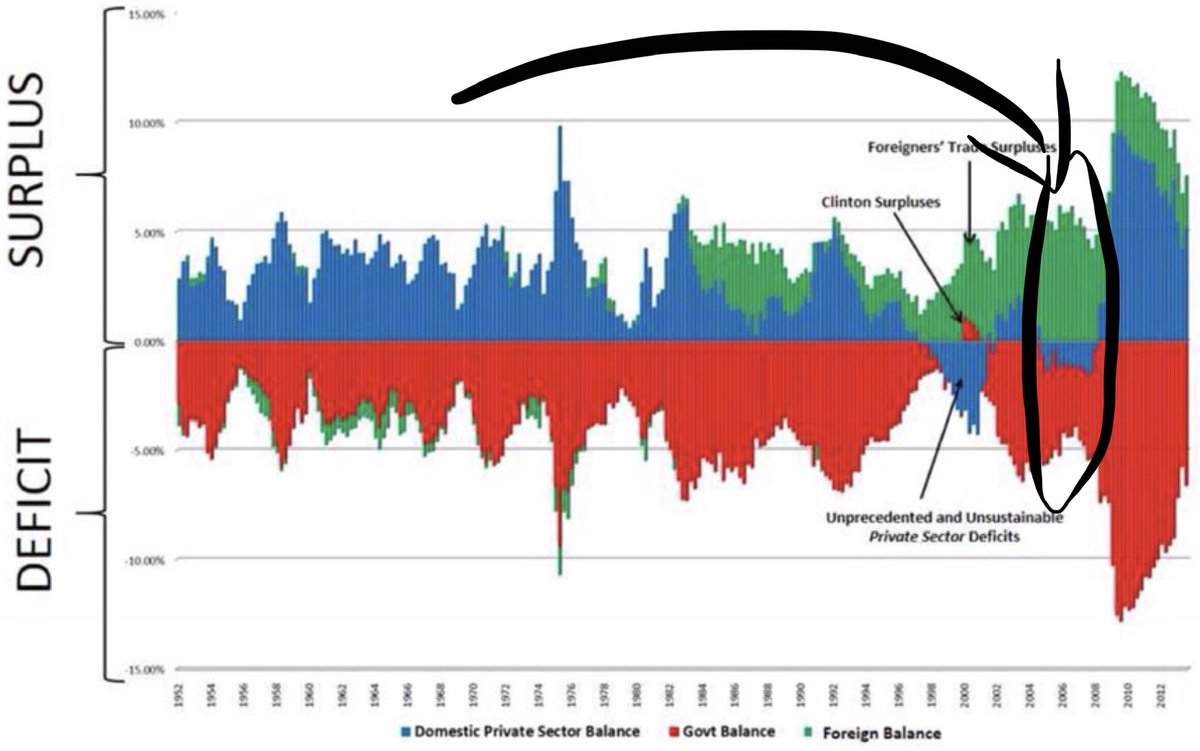You bet. A 'dollar' doesn't need to be undefined. It's the literal dollar in your wallet, or all of its legal equivalents. It's not anything that can be exchanged for a dollar. It's a dollar. A can of soup isn't a dollar, it's just worth a dollar. Same with IBM shares or a nugget of gold. Or even my promise to pay you a dollar.
Okay, the underlying premise is that an economy is running just fine if people are employed making stuff that other people want. It can almost be viewed as a barter system, and we often do. We just use dollars as a proxy. It's where we run into the problem of thinking of a can of soup AS a dollar. In the end, I'm trading gardening for roofing. And me tending your garden in exchange for you roofing my house is
better than both of us just sitting at home doing nothing, or me just wasting my time roofing when I garden so much better. The thing is, in our economy, we need dollars to start the process. I come to you with $100 so that you'll roof my house and then you'll hand back that $100 for me to garden. The net spending is zero, but we're both better off. Even if your result of the transaction is zero savings (in dollars) the fact that you got
stuff done means you're better off.
So, then we get into the
reality of how money works. All dollars (except printed ones, infra) are borrowed into existence. This means that interest is owed and also the dollars are temporary. If I go to the bank and borrow $100, then two things are created at the same time. The first is my debt to the bank. The second is literally the $100 bill. In the United States, y'all use fractional reserve banking, so there's a second set of debt created as well, but it's completely immaterial to the discussion except when we're explaining why certain organizations were buying negative-yielding bonds.
But in Canada, it literally just happens at our bank level. One second there're zero dollars. The next second there's a hundred dollars and a debt for one hundred dollars plus interest.
It's the 'plus interest' part that matters. This means that there's never enough money to pay off all the debts outstanding. When I borrowed the $100 so that you'd roof my house, I can only (at most) get back $100 from you by gardening. It doesn't matter how much I garden. I could garden like a gardening-gardener-who-really-knows-how-to-garden and the most I can get back from you is $100. Unless new money is created in the meantime. Then I can hustle for those dollars to pay my interest. Without new dollars, either I default on my loan OR I'm tricked into being endlessly enslaved thinking that I could possibly work off my debt. But the outright worst scenario is that I don't actually do any gardening. The money is fiat and doesn't really exist. The fact that my house needs a better roof and your garden needs tending *actually* matters with regards to how tomorrow looks. If there's no money available for me to pay off my loan, then I'm going to huddle and do nothing, because I can afford nothing.
When I pay back the $100 to the bank, that money just (literally) disappears. It's
gone. No one owns it. My debt disappears and the money disappears at the same time. The bank owns the interest I paid, though. So, next time I go out looking for money, I could approach the bank to see if they need any gardening done. Keep in mind, with the profitable exchange to happen (roofing for gardening) there
must be more than one hundred dollars in the economy, or else the profitable exchange results in one person defaulting ... and there's no 'real' reason that should happen.
The
really important part is that the $20 I currently (literally) have in my wallet means that
someone is in debt $20 (plus interest). It could be a household. It could be a business. It could be a government. Somebody owes the money that I have. The entire system is stable if someone else borrows a new dollar into existence for us to scramble over. Now, eventually everyone realizes that they've borrowed too much, because all the dollars are being held by people who feel no need to spend them (you've nothing they
want). We then all hunt for dollars to pay off our loans, but there's not enough money available to pay them all off. So, to save money, I delay roofing my house and you delay gardening. Because I delayed, you don't get paid. Because you delayed, I don't get paid. And our assets materially crumble for no real reason other than the economy is 'broken'. Because of this potential damage, the government can
literally just print money and hand it to one of us and then we both employ each other again (in the US, this takes the form of the Fed buying something). And then there are extra dollars that can actually land in a savings account, even if it's not backed by debt. Since a lot of savings are perpetually unspent, it doesn't matter. It just sits in a savings account. It's an economic reality that those dollars
could be spent, but it's also a behavioural reality that some
won't be.





 We know that DE bookkeeping is useful for matching income and expense accounts to make sense of transactions. Like most of accounting it is backward looking. It is not so good as a forecasting tool. Does MMT have the ability to forecast?
We know that DE bookkeeping is useful for matching income and expense accounts to make sense of transactions. Like most of accounting it is backward looking. It is not so good as a forecasting tool. Does MMT have the ability to forecast?